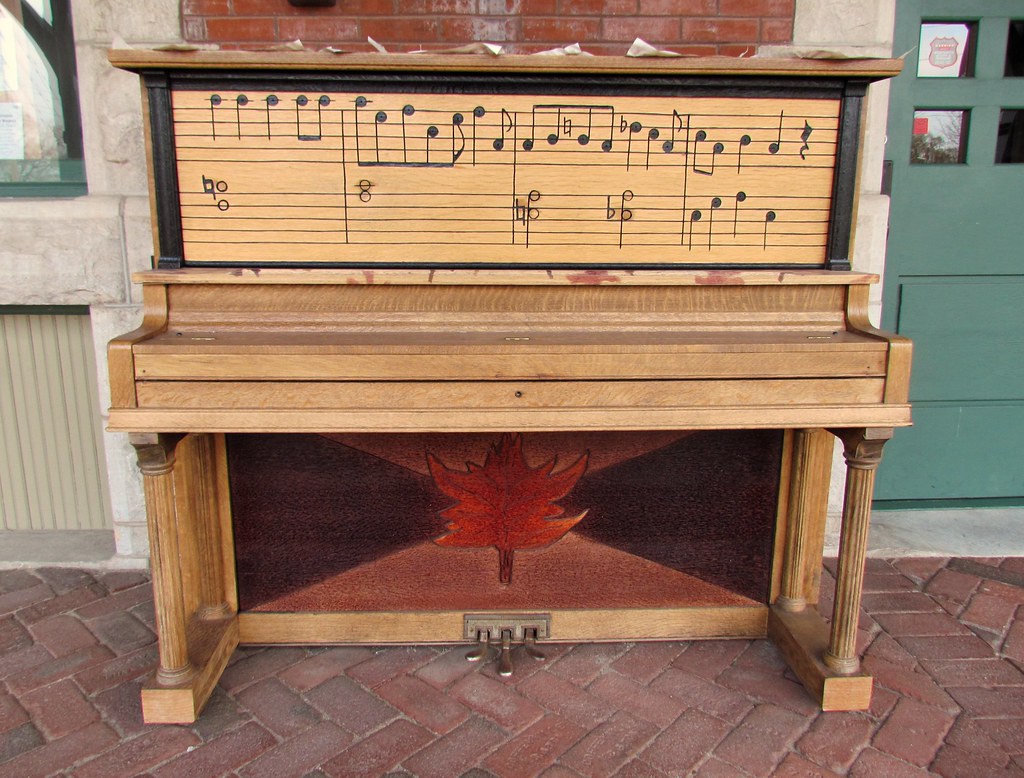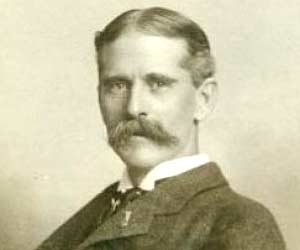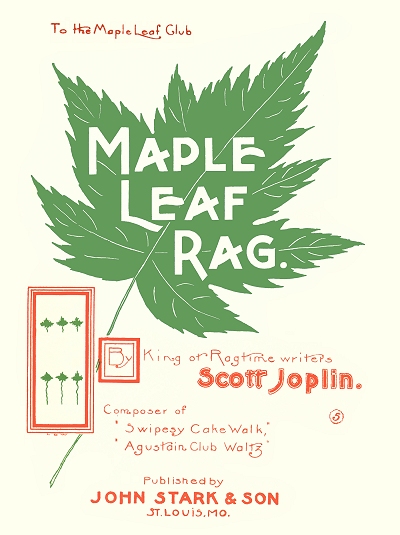"Use the talents you possess, for the woods would
be very silent if no birds sang except the best."
AUTHOR: Henry Van Dyke
MEANING OF THE QUOTE:
"A person does not have to be a professional musician
in order to experience the joys of making music."
COMPOSER
MAPLE LEAF RAG
Written in 1899, although not the first rag
written or published as Ragtime had been
around for only a few years,
the Maple Leaf Rag
(also a favorite of President Theodore
Roosevelt's daughter) became the first
instrumental piece to sell over one
million copies. (The Charles K. Harris
 |
| http://parlorsongs.com/bios /ckharris/ckharris.php |
song, "After The Ball"
AFTER THE BALL

Sung by Charles K. Harris
Published in 1892, it was supposedly
the first song to sell a million copies
of sheet music. This film must have
been made prior to December 1930
when Harris died.
from 1888, was the first million selling
piece of sheet music, but Maple Leaf
did it in a shorter amount of time,
reportedly in less than a decade.)

In the days before mainstream
sound recording it was this best
selling sheet music of Scott Joplin's
which helped propel the popularity of
the Ragtime style to move from the
bars, where it originated,
 |
| Bar Room Performances |
into respectable homes
and public places.
| Parlor Music |
The rag was named in honor of the venue,
the Maple Leaf Club

in which it was allegedly first heard (and
one of the clubs where Joplin performed)
by the white Sedalia businessman and
Joplin music publisher, John Stark.
 |
| John Stark |
The probable source of the name
followed the trend of naming
organizations after trees in the area.

Before working for Stark
 |
| Stark |
Joplin encountered many rejections
and was unable to make any substantial
sales but after the piece was an instant
success and its first printing of 10,000
copies sold out quickly (75,000 copies
were sold within six months). More than
half a million copies were sold by 1909.
(All these sold without the promotional
help of radio, television, or the internet
which did not exist yet.) Stark and Joplin
signed a contract and both moved to
St. Louis, Missouri.
St. Louis, Missouri.

There Stark vigorously promoted his
client giving him the nickname
"King of Ragtime."
The financial success of the
Maple Leaf Rag not only created a
demand for more Joplin compositions
but also enabled Stark to open a music
store and printing shop in St. Louis
and then later in New York.

There are many stories about how Joplin
and Stark became associated as a result
of this rag. Research done by a Joplin
biographer, Edward Berlin,
said that a young lawyer, a friend of
Stark's son, who was running the
Sedalia store, offered to help Joplin
present the piece to the firm as well as
draw up the paperwork. When Stark
heard the piece he was impressed
enough not only to take on the Maple
Leaf Rag but to offer Joplin an unheard
of royalty agreement as well (a one-cent
royalty for each copy and ten free copies
for his own use including an advance; an
estimated $360 per year on this piece
in his lifetime).
 |
| http://forum.skyscraperpage.com/showthread.php?t=195574 |
 |
"Missouri in 1898: Scott Joplin and the 'Maple Leaf Rag.'" v. 92, no. 4 (July 1998), inside back cover. http://shs.umsystem.edu/historicmissourians/name/j/joplin/ |
GRANADA ADV. STRINGS
1. NUMB
INTRO. TO INSTRUMENTS
GRANADA
1. VIOLIN
a. Parts of the instrument:
1) Names
2) Care and Maintenance
3) Handing the parts out to look at
a. Reviewed parts
b. Quiz on parts
c. String Names
d. String name ear training
a. Parts of the instrument:
1) Names
2) Care and Maintenance
3) Handing the parts out to look at
HILLVIEW
1. VIOLINa. Reviewed parts
b. Quiz on parts
c. String Names
d. String name ear training
GRANADA BEG. STRINGS
1. CIELITO LINDO
a. Ending section
2. HO HEY
a. Ending section
2. HO HEY
HILLVIEW ORCHESTRA
1. 21 GUNS
1. 21 GUNS








.JPG)




